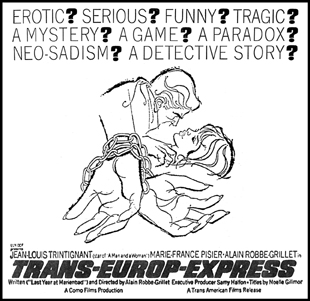
Reprinted from SHOCK CINEMA #11 (1997).
TRANS-EUROP-EXPRESS (1967).
Are you in the mood for a four-star blast of arthouse weirdness? Well, you've come to the right place, because this devilishly clever production is as playful with its structure as it is sublimely cinematic. And just in case this sounds too upscale for your tastes, there's also a coating of then-racy S&M to keep the deviant contingent amused. Director-writer Alain Robbe-Grillet is best known as the scripter of Resnais' LAST YEAR AT MARIENBAD, but before that he was a successful avant-garde novelist, and afterward, directed several equally odd art flicks, such as EDEN AND AFTER and L'IMMORTELLE. By far, the gloriously twisted T-E-EXPRESS received the widest US release.
Beginning on a train running from Paris to Antwerp, we encounter a cabin full of filmmakers (including Alain R-G himself) discussing the idea of making a movie set on a train -- with a vague notion that it should involve cocaine traffiking. It then cuts to Jean-Louis Trintignant, who buys a suitcase with a false bottom, stuffs several powdery white blocks into it, and heads for the train station. But wait, because when he runs into the filmmakers, they recognize Trintignant, consider casting him in their movie, and finally give his character a name -- Elias.
The entire script is blessed with similarly self-reflexive turns which betray the usual, linear route of storytelling. And as Elias' adventure thickens, the script purposely incorporates all of the standard EuroSpy trappings, including sinister assassins, various creepy liaisons, and the requisite hot dame. The later is ably provided by Marie-France Pisier (whose later career included everything from artsy hits like COUSIN, COUSINE to Tinseltown turds like THE OTHER SIDE OF MIDNIGHT), as a sultry prostitute named Eva. She provides most of the film's sex appeal, and that's plenty, especially during a little (now-lightweight) bedpost-bondage with Elias.
All the while, the camera returns to the filmmakers, who continue to discuss the plot of their -- or rather, this -- movie. They even rethink the storyline as it plays out on screen, and change events when a problem arises. As the line between reality and fiction is stripped away, this becomes a fascinating meditation on the creative process, aided by cinematographer Willy Kurant (whose career has veered from Godard's MASCULINE FEMININE to Barbara Eden's HARPER VALLEY P.T.A.). Methodically paced, to be sure, but there's always a swift sense of humor and a method behind the madness. Beautifully constructed and totally accessible, this brings the arthouse and the grindhouse together into a movie-addict's wet dream.